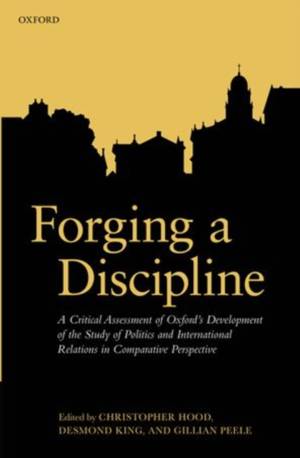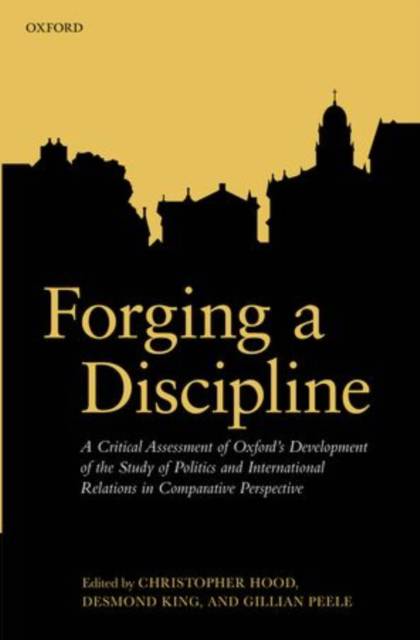
- Retrait gratuit dans votre magasin Club
- 7.000.000 titres dans notre catalogue
- Payer en toute sécurité
- Toujours un magasin près de chez vous
- Retrait gratuit dans votre magasin Club
- 7.000.0000 titres dans notre catalogue
- Payer en toute sécurité
- Toujours un magasin près de chez vous
Forging a Discipline
A Critical Assessment of Oxford's Development of the Study of Politics and International Relations in Comparative Perspective
Christopher Hood, Desmond King, Gillian Peele
Livre relié | Anglais
175,95 €
+ 351 points
Description
Forging a Discipline analyses the growth of the academic discipline of politics and international relations at Oxford University over the last hundred years. This century marked the maturation and professionalization of social science disciplines such as political science, economics, and sociology in the world's leading universities. The Oxford story of teaching and research in politics provides one case study of this transformation, and the contributors aim to use its specifics better to understand this general process. In their introductory and concluding chapters the Editors argue that Oxford is a critical case to consider because several aspects of the university and its organization seem, at first glance, to militate against disciplinary development and growth. Oxford's institutional structure in which colleges enjoyed autonomy from the central university until quite recently, its proximity to the practice of government and politics through the supply of a steady stream of
senior administrators, politicians and prime ministers, and its emphasis on undergraduate teaching through intensive small group tutorials all distinguish the development of teaching and research on politics in the university from such competitors as Manchester or the LSE as explained in one of the contributions. These themes inform the book's chapters in which the contributors examine the founding of the first dedicated position in political science in the university, the study of the British Constitution and the development of electoral studies, the introduction and consolidation of international relations into the Oxford social science curriculum in contrast to the way in which war studies emerged, the commitment to research and teaching in political theory, the careful harvesting of area studies, particularly of Latin America and Eastern Europe including Russia, and the distinctive role of Oxford's two social science graduate colleges, Nuffield and St Antony's, in fostering a
graduate programme of study and research. What emerges from these historically researched and analytical accounts is the surprising capacity of members of the politics discipline at Oxford to forge a leading place for their scholarly perspectives and research in such core parts of the discipline as political theory, the study of comparative politics as a subject rather than as an area, ideas about order in international relations and the scientific study of elections in Britain and comparatively. That these achievements occurred in a university lacking the formal system of hierarchy and, until the last decade, departmentalization makes this volume a valuable addition to studies of the professionalization of social science research and teaching in modern universities.
senior administrators, politicians and prime ministers, and its emphasis on undergraduate teaching through intensive small group tutorials all distinguish the development of teaching and research on politics in the university from such competitors as Manchester or the LSE as explained in one of the contributions. These themes inform the book's chapters in which the contributors examine the founding of the first dedicated position in political science in the university, the study of the British Constitution and the development of electoral studies, the introduction and consolidation of international relations into the Oxford social science curriculum in contrast to the way in which war studies emerged, the commitment to research and teaching in political theory, the careful harvesting of area studies, particularly of Latin America and Eastern Europe including Russia, and the distinctive role of Oxford's two social science graduate colleges, Nuffield and St Antony's, in fostering a
graduate programme of study and research. What emerges from these historically researched and analytical accounts is the surprising capacity of members of the politics discipline at Oxford to forge a leading place for their scholarly perspectives and research in such core parts of the discipline as political theory, the study of comparative politics as a subject rather than as an area, ideas about order in international relations and the scientific study of elections in Britain and comparatively. That these achievements occurred in a university lacking the formal system of hierarchy and, until the last decade, departmentalization makes this volume a valuable addition to studies of the professionalization of social science research and teaching in modern universities.
Spécifications
Parties prenantes
- Auteur(s) :
- Editeur:
Contenu
- Nombre de pages :
- 312
- Langue:
- Anglais
Caractéristiques
- EAN:
- 9780199682218
- Date de parution :
- 15-04-14
- Format:
- Livre relié
- Format numérique:
- Genaaid
- Dimensions :
- 236 mm x 163 mm
- Poids :
- 601 g

Les avis
Nous publions uniquement les avis qui respectent les conditions requises. Consultez nos conditions pour les avis.






